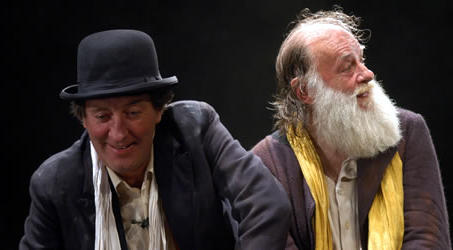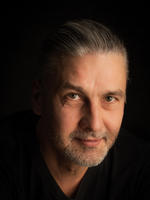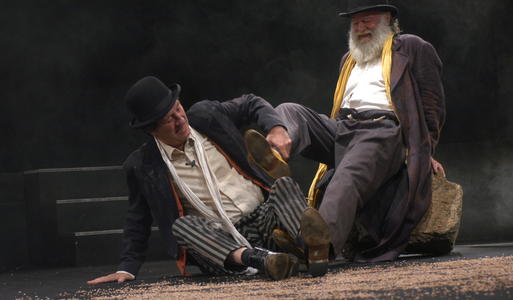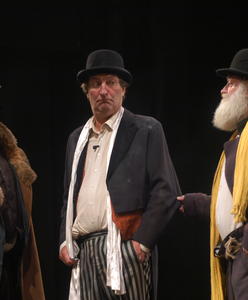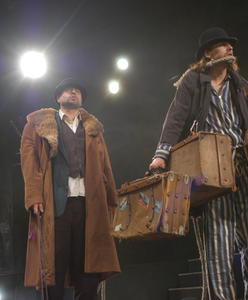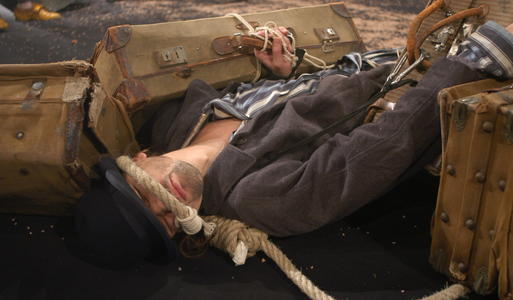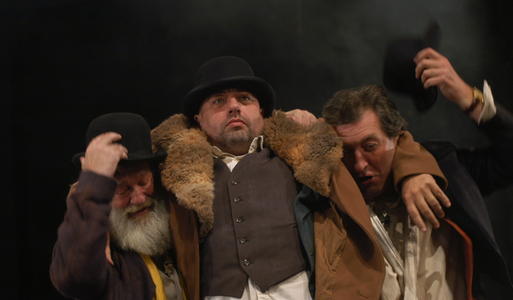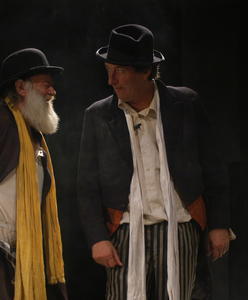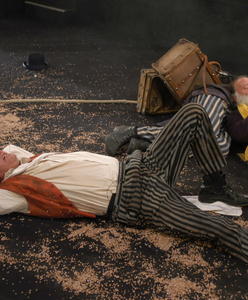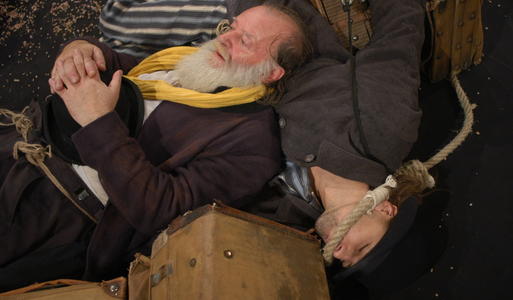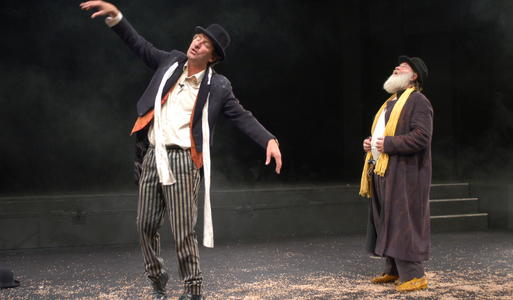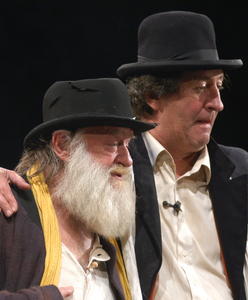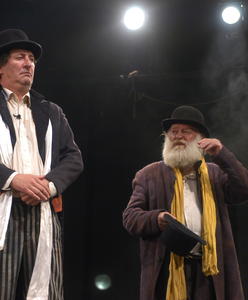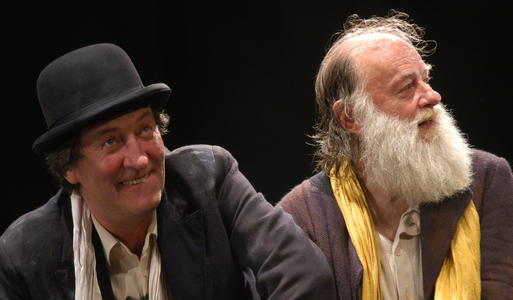What Is the Waiting for Godot with Polívka Like?
Zdeněk A. Tichý 19. November 2003 zdroj Naše rodina
Sold out. The eloquent notice may be read regularly with almost any performance given by the Brno Municipal Theatre. The theatre headed by the director Stanislav Moša enjoys favour of home and foreign audiences. Recently, tours about various European countries have been included in “common working duties” of the company members.
Though musicals are the most successful titles of the Brno Municipal Theatre, their audiences are not underestimated. This is proved, among other things, by exceptional theatre programmes including, besides texts of plays, devoted studies about authors or themes of plays, period documents found out in archives and dozens of photos. And the repertory composition where more serious dramas are included is eloquent, as well. The more serious dramas are represented for example with adaptation of Bulgakov’s novel The Master and Margarita or the newest Beckett’s Waiting for Godot, studied by the director Zdeněk Černín in co-production with the Bolek Polívka Theatre.
Zdeněk Černín assigned the parts of Vladimir and Estragon, the main couple of tramps waiting in vain for the arrival of mysterious Godot in an isolated place, to a couple of actors who are, similarly as their heroes, tied together with many years’ intimate friendship: Boleslav Polívka and Jiří Pecha. And the two men are the main reason why to go to Beckett in Brno. That is, the performance offers quite sophisticated but not very marked interpretation of the drama where looking for parallels with present can be found. A bizarre couple of Pozzo and Lucky – master and servant, played by Zdeněk Junák and Patrik Bořecký, represents a picture of complete, self-destroying dependence wandering in a vicious circle, from which there is no escape. The principal pair of tramps, whose dresses remember better times, offers comments on the fates of people vegetating on the edge of society. The text flows slowly and is refreshed soberly with places where Polívka and Pecha play sketches of tired clowns making jokes of mere inertia.
Dancing with a metal tree, serving carrot and radish, putting on Lucky’s hat, singing the song “A Dog Ate a Sausage” - in these studies, Polívka’s temperament is working its way out, actuating him to make banal situations exceptional with mimic and grotesque spice. Only in the scenes where Polívka and Pecha do not look for useless pseudo-complicated twists in Beckett’s text, the real reason for their common playing in the Waiting for Godot comes out. Propinquity of their Vladimir and Estragon, men’s intimacy – hard and tender at the same time, the capability of irony and self-irony, putting down and hurting one another, and subsequent reconciliation – this cannot just be played with such intensity. This must be lived through.
Dramatic Gala Concert of Brno Clowns
Jaroslav Pokorný 9. November 2003 zdroj Scena.cz
Godot on Czech Stages for the Sixth Time
The overcrowded Brno Municipal Theatre. Spectators in the auditorium. Spectators on the stage. Some boulders, a dry tree from iron, a path made from pebbles and a couple of enigmatic dossers in the middle of the arena specially built by the stage designer Jan Dušek. They are all sitting and waiting in silence. For whom? Well, for Godot.
Czech producers decided to wait for the sixth time for the mysterious gentleman whose arrival is always very doubtful and about whom all stacks of theoretic works had been written for fifty years since its memorable first night in Paris that passed this January. The author himself called his most famous play a “devilish western”. Perhaps because it was considered one of the most ingenious dramatic works after it had gone around the whole cultural world.
Zdeněk Černín got bold hold of direction. Just the enforcement of such a demanding play in the dramaturgical plan desires great admiration and even greater praise at present. Moreover, Černín interpreted the text very humbly. He gave up the burden of deep psychology, but worked out carefully sharp contrasts of fun and horror, providing the audiences with the resulting unusual meditative theatre full of poetry.
Naturally, that all could not arise without the central couple of waiters, Vladimir and Estragon. Their waiting for the mysterious Mr Godot who is not coming and may never come set the course of the whole play. Thus, both dropouts of humanity are waiting and waiting, talking and talking, playing with their ideas and waiting again. Just to kill time. The time drives another unrestrained couple to meet them – a lord and his servant, bizarre Pozzo and swinish Lucky, and a child as a mysterious symbol of hope – as mysterious as Godot himself.
The cast of the principal couple is another master move of the director Černín. In spite of the first-rate potential of home actors, he did not hesitate to invite two guest artists - Bolek Polívka and Jiří Pecha to cooperate. That was more than rewarding as there is no more harmonized couple in the Czech theatres that would master the task better.
The heroes become suddenly not only actors, acrobats, clowns, but also dossers or lifeless desperados. Horrible and comic at the same time. Moreover, they both seemingly forget sometimes they act Estragon and Vladimir, open and act themselves, their own life stories. A fantastic clownish tragicomedy has turned up! They are two, being one in fact. With absolute lightness, certainty and freedom they create a varicoloured picture of a man, maybe of mankind. They fully command the audience, shake the truth, set a mirror and shock with cognition. In short, a dramatic gala concert in a fantastic rhythm...
ON A PERCH
21. October 2003 zdroj Mladý svět
Bolek Polívka and Jiří Pecha got together on one stage again. The director Zdeněk Černín cast them respectively as Vladimir and Estragon in the Beckett’s play Waiting for Godot. The text that belongs to the principal pieces of modern theatrical literature is presented by the Brno Municipal Theatre in co-production with the Bolek Polívka’s Theatre. The presentation is streets apart from Polívka’s fluttering TV arenas and is the strongest in the moments when Polívka and Pecha are playing through Beckett about themselves, their friendship and comedian’s fates.
Polívka and Pecha Succeeded in Waiting a la Beckett
Luboš Mareček 20. October 2003 zdroj MF dnes
The Brno Municipal Theatre and the Bolek Polívka Theatre prepared an unusual co-production performance in Brno. Both theatres are presenting the famous Beckett’s play Waiting for Godot. The play, one of the cornerstones of the absurd theatre, has the same performers on the two Brno stages, but different scenes and audiences.
The lifelong journey of the quaint couple prescribed by Beckett is copied in its intensity as well as length by the two principals Bolek Polívka and Jiří Pecha, making an inseparable couple of friends and artists. And just thanks to them, the audiences accept the presentation kempt by direction and bringing no breakthrough. Polívka and Pecha represent ideal (and in Brno maybe sole) interpreters of Didi and Gogo. They respond perfectly to one another and jointly manage to attract the audience with the text, too inscrutable and indigestible for a lot of spectators. Of course, they both tame the audiences with their irreplaceable grimaces and besides, any faecal cue or vulgarism works reliably on Polívka’s private stage. However, their capability of conjuring up a mixture of tangible anxiety, sordidness, fear, resignation and fruitless hopes from the Beckett’s text is critical.
Černín used an arena as a stage in his maternal theatre. The audience encircles actors and, simultaneously, viewers observe each other vis-á-vis. The catching design underlines the closing of the evening. The life drama of two dropouts is framed with and reflected in the community of spectators as poor as the protagonists in their destinies and vain waiting.
Polívka’s fans may be rather surprised at the disciplined acting of the Vlachian King substituting the crazy improvisation of his own opuses. The performances of the seconding couple Zdeněk Junák and Patrik Bořecký do not get lost either. The Brno dramatic presentation fulfilled a tough task: looking at the popular comic, various audiences devour the difficult play. This happens almost inadvertently, without depressive waiting for the end.
Godot Did Not Come, Peca and Čorba Did
Jiří P. Kříž 10. October 2003 zdroj Právo
More than six months Beckett’s Waiting for Godot had been waited for after an unhappy injury of Boleslav Polívka at the beginning of rehearsals. Opening nights directed by Zdeněk Černín took place in two Brno theatres: in the Brno Municipal Theatre at the first weekend in October and in the Bolek Polívka Theatre less than a week later.
In Waiting for Godot, Boleslav Polívka and Jiří Pecha, the faithful fellows from the shining and unyielding theatre Husa na provázku (Goose on a String) of 1970’s and 1980’s (acting in the plays: The Tots, Pezza versus Čorba, Commedia dell’arte, Ballad for a Bandit, Sportsmen’s Feast, Therapy) met meaningfully on stage after some time. And they met to confirm that the end of their clownish time has not come yet.
Stacks of paper have been written on the theme who is Beckett’s Godot. However, Černín’s concept of Beckett’s absurd thoughts of a human fate and its inscrutability, happiness, waiting for deliverance and death – that are not coming – gave the opportunity to the great concert of the two actors.
I can feel clearly (even in the Prague version of Godot by Juraj Herz, David and Leoš Suchařípas in the Činoherní klub (Dramatic Club) two years ago) that Beckett’s theme has been overcome in the present world. The present world is different from the world of the beginning of 1950’s when another war was about to fall and people were waiting more intensively even for a hope: to live, to change themselves and the others. The same is that Godot neither came then nor comes today.
The Brno Waiting is stronger than the Prague one as the old bards Peca and Čorba waited to see one another on stage supported by their co-actors Zdeněk Junák and Patrik Bořecký. When they seemingly forget they are playing Estragon and Vladimir and present what is in themselves, the art of their excellent joint clownery blows to the audience.
Černín Has Found an Ideal Couple of Polívka and Pecha for Godot
Simona Polcarová 8. October 2003 zdroj Rovnost
The popular musical Brno Municipal Theatre is skating over thin ice of untraditional drama and experiment for the second time this season. After the first night of Stony Guest interlaced with arias the theatre offered at the weekend the absurd and nihilistic drama Waiting for Godot by Samuel Beckett as the second novelty of the season. The presentation directed by Zdeněk Černín was created in cooperation with the Bolek Polívka Theatre and was put on with a slight delay due to Polívka’s injury last year.
Waiting for Godot belongs to the eloquent masterpieces of modern world playwriting, but it appears quite rarely on Czech stages. Formerly, the play had a hallmark of something prohibited and revolting, today, however, its rather monotonous text and minimal action will hardly shock or surprise. Though the title is still considered extraordinary, one may easily break one’s back on its performance.
As the director Černín realized well, the key to the stuff lies in particular in the right assignment of the roles of Vladimir and Estragon in order to be credible and pleasant to the audiences, otherwise nobody would believe their truths. Undoubtedly, Černín made a perfect decision choosing the guest actors Bolek Polívka and Jiří Pecha for the main parts. They created on stage a couple of sad clowns and tramps having a warm relation to each other and hoping in their salvation by Mr Godot advised in the title. Vladimir and Estragon, calling one another Didi and Gogo in private, treating mutually their sores and glooms and trying to make laugh one another, are confronted with a strange surrounding world represented by the poser Pozzo and his slave Lucky. Their time passes slowly and aimlessly without perceiving any recognizable difference between yesterday, today and tomorrow. The true about a human fate, coming out very slowly and inconspicuously and rather illegible between the lines, is enchanted in their waiting. At the moment of Vladimir’s final insight, actually inward feeling of anxiety resulting from the cognition turns up. However, Černín gives a hope to the spectator as his heroes look up to the stars at the end.
The most fascinating feature of the performance is the perfect relation between Polívka and Pecha and their impeccable ability to respond to one another. From time to time, they make a joke in humble silence under Černín’s supervision, however they breathe entirely in the spirit of the play. In comparison to them, Pozzo (Zdeněk Junák) is as if he were from a different world, which is not any harm, because he is really coming from a different world. Almost dumb creation of ill-treated Lucky (Patrik Bořecký) who never loses his own dignity is also remarkable.
Thanks for Godot’s “Arrival”
Jaroslav Parma 1. December -1
Samuel Beckett’s tragicomedy “Waiting for Godot” put on for the first time in the Théatre de Babylon in Paris just fifty years ago is called modern classic. It became a play of a cult for leading theatres but also a perfect verification of dramatic abilities, in particular of the two principals. The Brno presentation (first nights on 4th and 5th October) benefits considerably from the fact two outstanding personalities - Boleslav Polívka and Jiří Pecha, not only accomplished colleagues on stage, but also friends knowing each other very well in their civil lives – are playing in the town. No wonder the director of the Brno Municipal Theatre Zdeněk Černín asked them for collaboration and it is gratifying they agreed. Moreover, the play is presented in cooperation with the Bolek Polívka Theatre with one curiosity: While the actors are playing in the middle of audiences in the Brno Municipal Theatre, a classical arrangement is preserved in Bolek’s theatre.
This time, Zdeněk Černín observed anxiously the text as well as the directorial notes written by the author, did not look for any experiments as other theatres try to do, just shortened some places, which caused no harm but did good to the course of the presentation.
For actors, the work is very demanding. Not because of an excessive amount of text, but on the contrary, as the dialogues are limited to bald announcements, statements of two or three words. However, all who introduce themselves are excellent. Boleslav Polívka as Vladimir and Jiří Pecha as Estragon are bringing their distinctive refreshing humour in the endless waiting for Godot, while Zdeněk Junák (Pozzo) and Patrik Bořecký (Lucky) are bringing excitement.
The final applause calling the actors again and again on the stage was a clear evidence of the right selection of the second play of the 59th season. Though Vladimir and Estragon are still waiting for Godot, the audiences may thank the dramatic adviser Jiří Záviš and the director Zdeněk Černín for Godot’s arrival.
You have to play into my hand from time to time...
Michal Čunderle 1. December -1 zdroj SAD
YOU HAVE TO PLAY INTO MY HAND FROM TIME TO TIME OR DIDI POLÍVKA AND GOGO PECHA
I am reminding these two generally known facts because it is not possible to unthink them completely when watching Boleslav Polívka in his part of a sad clown Vladimír in Waiting for Godot by Beckett. But why should we do it anyway? Brightening and darkening of Vladimír by Polívka and Polívka by Vladimír is one of the most interesting qualities of the Brno version. Or in other words: personality or author acting is of the utmost importance in this presentation. However, it should be said that Waiting for Godot directed by Zdeněk Černín, a joint production of the Městské divadlo Brno and Bolek Polívka´s Theatre, is no one man show. It cannot be, because essential topics of loneliness and togetherness keep emerging in the play, for which at least two characters are needed. In Brno, Jiří Pecha is the other equal partner. Vladimír (Didi) and Estragon (Gogo), being somewhere in a desert space populated only with one tree and a stone, are pushed out to a stony path enclosed on both sides by a steep slopes of the auditorium, they are in an emptiness where nothing happens and where there are only the two of them, day after day, night after night. They cannot leave, because they have to wait, and probably because there is no place to go. It is obvious that Boleslav Polívka and Jiří Pecha are perfectly gifted for the roles of Vladimír and Estragon – not just with their actor’s talents but also with their respective personality potentials and mutual partnership, with what irradiates from them without the necessity to speak. Their contrasting appearance as such is meaningful. Vladimír, on one hand, is the taller and more flexible one, he straightens and from his sufficient height, viewing from above, he monitors what is happening around. Or what is not happening, in fact. Even the tiniest impulse raises his interest, activities and investments. In an instant, he is fully able to start the play and offer possibilities. He reacts without prejudices, sometimes gratefully; he does not reject any proposal; passivity is unknown or unbearable for
him.

